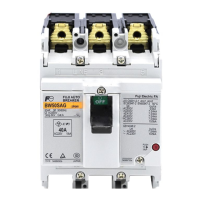5
1
Protecting low-voltage circuits
1-2 Overcurrent protection
1-2 Overcurrent protection
1-2-1 Overcurrent fault
Overcurrent occurs when a circuit is exposed to current that
is higher than the rated load current. It may be due to short
circuiting in a circuit or to overloading that occurs when a
motor overloads or the rotor locks. In either case, overcurrent
can damage cables, and switching devices and load
equipment connected to a faulty circuit, and can easily spread
to other systems. Overcurrent protection devices are installed
to protect cables and other devices connected to a faulty
circuit while minimizing damage to systems beyond the circuit.
1-2-2 Overcurrent protection
(1) Overload protection
When overcurrent caused by motor overload or a locked
rotor reaches as much as six times the motor rated current, it
results in thermal damage. A circuit breaker is used to ensure
quick tripping to protect the connected devices – the breaker
having a lower operating characteristic curve than the heating
characteristic curves of the motor winding and cable.
(2) Short-circuit protection
Since short-circuit current is caused by a short in a circuit,
it tends to be fairly large. The actual amount is calculated
from the power supply capacity, power supply voltage, and
cable impedance to the shorting point. It can vary significantly
with low-voltage circuits from near the rated load current to
several hundred times the rated load current depending on the
shorting point. This has prompted studies first to find circuit
breakers with rated capacities that can handle massive short-
circuit current, and second to look into materials that can
protect against the electromagnetic forces generated by the
shortcircuit current peak value Isp and the joule integral (I
2
t) in
circuits before the breaker cuts current off completely.

